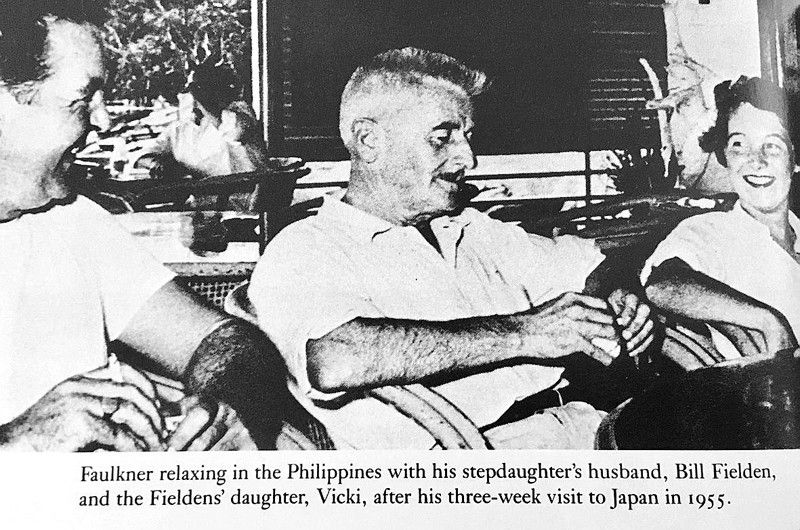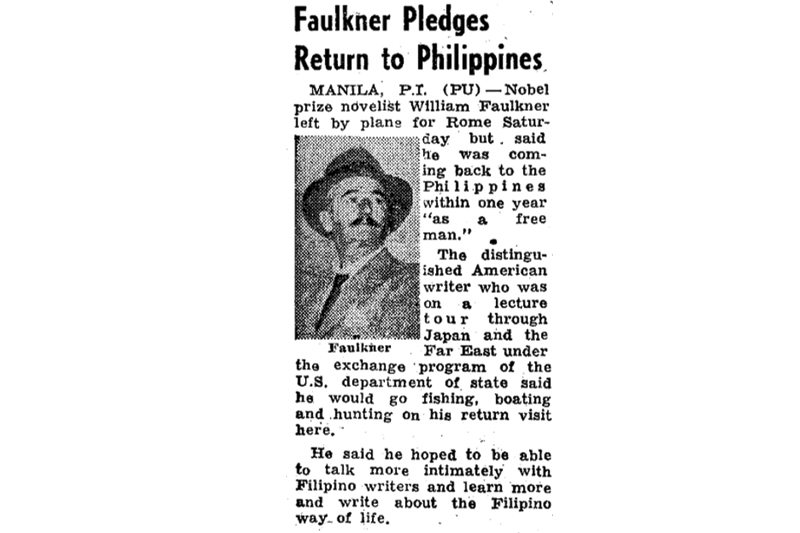Faulkner in Manila

A few weeks ago, I wrote about the visit to Manila in 1951 of the American writer Wallace Stegner, mentioning that 10 years earlier, he had been preceded by the even more celebrated Ernest Hemingway. I also said that they were followed in August 1955 by yet another titan of American literature, the 1949 Nobel Prize laureate William Faulkner — a visit I’d first learned about by staring at a small poster from that event on the wall of the old Creative Writing Center in UP back in the 1980s.
That poster, wall, and center sadly burned down with the Faculty Center fire four years ago, but I’ve always been intrigued by what brought these big-name authors over to our shores, and what they possibly could have told their local counterparts (there’s a picture somewhere of a very young and very short NVM Gonzalez getting the autograph of a hulking Hemingway).
Hemingway was stopping over on his way to China; Stegner was brought over by the Rockefeller Foundation; and — thanks to a clipping and other materials sent by my Washington, DC-based friend, Dr. Erwin Tiongson — we know now that Faulkner came here courtesy of the US Department of State, which sent their prize author on a tour of Asia, presumably to foster peace and goodwill during the Cold War. (Interestingly, Faulkner’s wife Estelle had visited Manila the year before, and would write: “The artificially induced gaiety of the Far East is very pronounced here — a feverish clutching at nothing that is little short of terrifying — As I sit here now, looking out on Manila Bay with its warships and carriers — every one of them ready for instant action — I feel insecurity verging on panic.”)
William Faulkner may have been a giant in his time, but to young readers today weaned on Gaiman and Murakami, he might as well be as remote a figure as W. Somerset Maugham or Henry James. Some may have come across his classic short story “A Rose for Emily,” and a luckier few his novels The Sound and the Fury, As I Lay Dying and Light in August. As a fictionist, he was chiefly known for his use of the “stream of consciousness” technique that gave even his lowliest characters an ability to articulate their deepest and most complex thoughts and emotions.

But what did Faulkner have to say to his Filipino audience? I found the answer by locating the book Lion in the Garden: Interviews with William Faulkner 1926-1962 (New York: Random House, 1968, edited by James Meriwether and Michael Milgate), which has a whole chapter on “Faulkner in Manila,” based on transcripts of Faulkner’s talks published earlier by the Philippine Writers League.
There’s a short but charming documentary on YouTube (just look for “William Faulkner on his native soil”) where you can see him at home in Oxford, Mississippi, in 1952 and listen to his soft, somewhat cigar-burnt voice, and you can imagine yourself sitting in the audience in Manila in 1955, as he imparts these notions, among many others:
“I think that there is a great deal of beauty in any national language, national literature. But that tradition of literature must still be furthered more so that it can meet and can give and take from other national literary traditions. But by all means develop one’s own because there is a certain portion in the legends, the customs of any people, that are valuable, and the best way to get them into a universal literature is to bring them first into a national literature…. Nobody should turn his back on his own tradition, his own language, his own culture, to assume a foreign one. Let his own and the foreign meet and produce a universal one.”
“The writer must believe always in people, in freedom; he must believe that man must be free in order to create the art; and art is in my opinion one of the most important factors in human life because it has been art, literature, folklore, music, painting which have been the record of man’s rise from his beginnings. It is the writer’s duty to show that man has an immortal soul…. A writer’s job is not simply to get books printed but to find the truth, the fundamental truth…. I think that the setting of a novel is just incidental, that the novelist is writing about truth. I mean by truth the things that are true to all people, which are love, friendship, courage, fear, greed; that he writes in the tongue which he knows, which happens to be the tongue of his own native land…. I write about American Mississippi simply because that is what I know best.”
“There is a responsibility that goes with the privilege of saying what one thinks. One must have integrity to know the truth, to believe the truth, to speak the truth, for the sake of truth, not for the sake of aggrandizement or profit or policy, but the truth because it is true.”
* * *
Email me at jose@dalisay.ph and visit my blog at www.penmanila.ph.



















